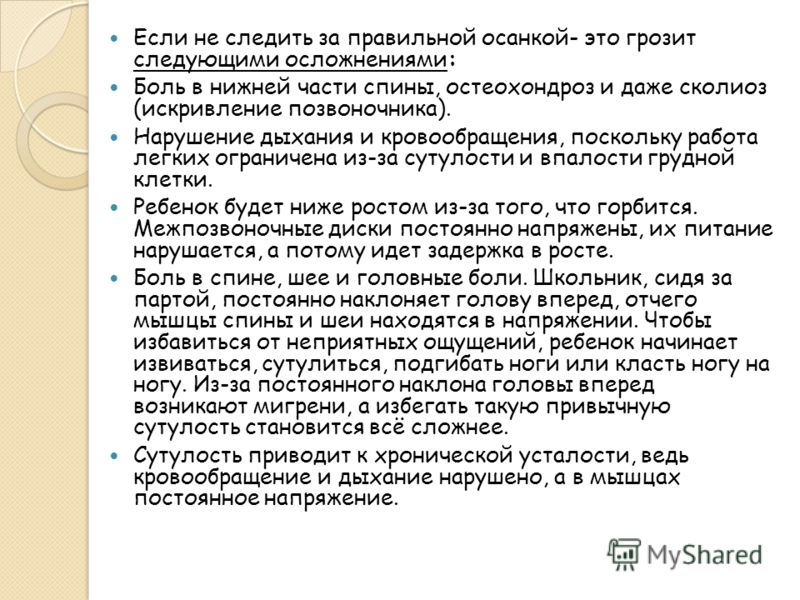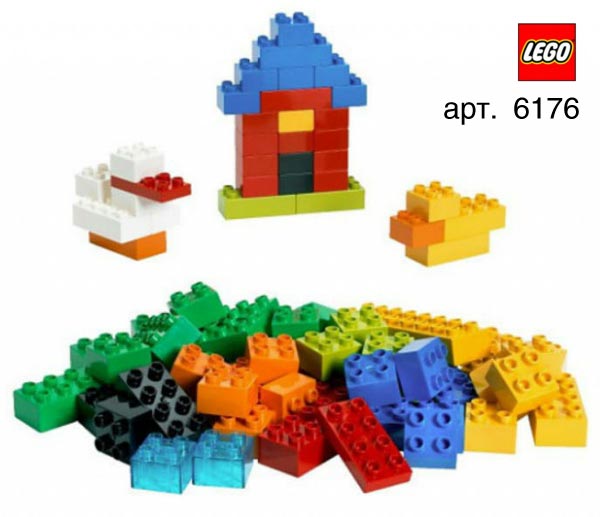Does it puff often? How to treat bloating
Flatulence, accompanied by bloating and colic, often accompanies gastrointestinal pathologies. Basically, increased gas formation occurs in violation of digestion. In this case, pills, an appropriate diet and folk remedies help to cope with it. Sometimes these symptoms signal a serious illness that requires immediate surgical intervention.
The etiology is very diverse. Gas formation occurs constantly during the digestion of food. This process is activated by the use of certain products. Gas is partially absorbed in the intestines, the remains are excreted from the body through the anus. Sometimes, for certain reasons, this does not happen.
If the gases do not come out, they accumulate in the intestines, bursting its walls and preventing food from moving. This is often accompanied by colic. The pain is so severe that a person literally cannot move. After the passage of gases, relief comes.
1. Some pathologies of the digestive system lead to bloating:
- Inflammatory diseases of the gastrointestinal tract (gastritis, enteritis, colitis).
- Congenital pathologies (narrowing of the intestine, gluten or glucose-galactose intolerance).
- Decreased peristalsis.
- Infectious diseases of the stomach and intestines.
- Dysbacteriosis (violation of the intestinal microflora).
- Insufficient production of enzymes.
2. In adults, the stomach swells in the absence of physical activity. For the same reason, bedridden patients and people with sedentary work constantly suffer from flatulence. In rare cases, bloating is the result of swallowing air while smoking.
3. Frequent stress slows down intestinal motility, disrupts the process of excretion and absorption of gases. This situation is provoked by the release of adrenaline during nervous shocks. It causes constriction of the vessels that feed the intestines.
4. Infants suffer from flatulence due to malnutrition by the nursing mother. Sometimes bloating is caused by foods that are not appropriate for the age of the child, introduced into his diet. In children who are bottle-fed, the stomach swells from a lack of digestive enzymes and improperly selected mixtures.
5. Flatulence during pregnancy is associated with increased production of hormones that reduce peristalsis. In addition to this, the intestines are constantly squeezed by the enlarged uterus and make it difficult for the passage of feces, which prevent the release of gases to the outside.
6. In women, bloating is provoked by gynecological pathologies (ectopic pregnancy, uterine fibroids). The presence of neoplasms in the abdominal cavity, adhesions or intestinal obstruction can interfere with the passage of gases. These are dangerous ailments that require the intervention of a surgeon.
7. Most often, the stomach swells in adults and children who have a violation of the microflora - dysbacteriosis. It develops against the background of poisoning, infectious or inflammatory bowel diseases, which lead to the massive death of beneficial bacteria responsible for digestion. Food ceases to be digested normally. This creates the conditions for the occurrence of fermentation and putrefactive processes that occur with intense release of gases. Dysbacteriosis in most cases is accompanied by diarrhea.
8. Increased gas formation in babies more often than in adults leads to colic. A small child cannot consciously push, facilitating the release of gases. He has to help by inserting a special tube into the anus. It is allowed to do a light massage of the abdomen.
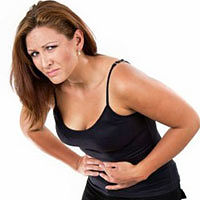

9. Some people wonder: "Why does the stomach constantly swell in the absence of any diseases?". Most often this happens due to the use of a large number of foods that cause increased gas formation. In adults, milk can provoke such a reaction. In this case, bloating is accompanied by diarrhea or constipation.
10. If puffiness after eating, it is enough to find out what foods cause this phenomenon and exclude them from the diet. It is worth giving up the habit of talking while eating. This leads to swallowing air, which increases the amount of gas in the intestines.
What to do if the stomach is often swollen?
There are many ways to get rid of flatulence. In addition to tablets, there are many folk remedies that reduce gas formation. Following an appropriate diet also helps to cope with the problem. Of course, if the cause of bloating is one of the diseases that contribute to excessive production or impede the release of gas, it will have to be cured first. A sign of the pathology of the gastrointestinal tract is the presence of diarrhea or constipation, nausea, vomiting, white coating on the tongue. Having noticed such symptoms in yourself, you need to contact a gastroenterologist and diagnose a disease that provokes bloating.
1. A tablet of Espumezan or Kolkida helps to quickly reduce the amount of gas in the intestines. These drugs collapse foam bubbles in the intestines. As a result, the volume of gas decreases and relief occurs.
2. To relieve pain in colic, intestinal antispasmodics are used (Papaverine and No-shpu, Iberogast, Spasmol, Plantex). For babies, instead of a pill, you can put a warm diaper on your stomach.
3. If swelling occurs against the background of diarrhea, enterosorbents are prescribed. They absorb toxins and gases and remove them from the body. So that the stomach does not swell as a result of diarrhea, they take several tablets of activated charcoal or one of the modern drugs (Polysorb, Smecta, Polyphepan, Enterosgel, Filtrum).
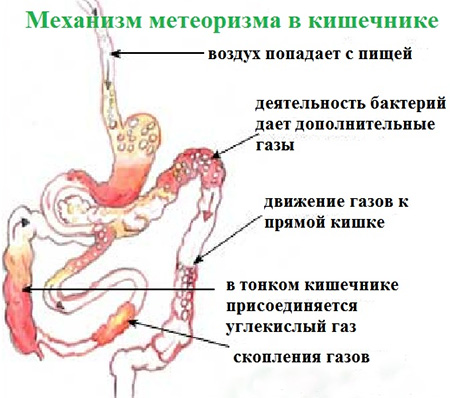
4. They are used to treat diarrhea in adults and children over 3 years of age. Smecta can be used from birth. This drug is not absorbed by the intestinal walls and is quickly excreted from the body.
5. Diarrhea and increased gas formation caused by a lack of enzymes are eliminated with the help of medicines that promote the breakdown of fats and vegetable fiber. These include: Creon, Pancreatin, Festal, Mezim, Enzistal. These drugs are made from extracts of the pancreas and bile. They greatly improve digestion.
6. An effective cure for bloating is probiotics. They contain live bacteria of the beneficial intestinal microflora and substances that ensure their vital activity. These medications are completely harmless. But since the microflora of adults and children has a different composition, it is better if a doctor selects them.
7. There are pure probiotics (one- or two-component). This is Duphalac, Lactusan, Normaze. The latest generation of drugs include dual-action drugs. They contain, along with living bacteria, sorbent substances. Representatives of this group are Laktofiltrum, Maksilak.
8. If bloating is accompanied by nausea and vomiting in addition to diarrhea, you can take a Motilium or Passagix tablet. They belong to prokinetic agents, accelerate the release of gases due to increased peristalsis and have an antiemetic effect.
9. People suffering from flatulence need to walk in the fresh air more often and do exercises in the morning. Physical activity (running, swimming, dancing) improves peristalsis and is a good prevention of constipation.
What to do if you suffer from gases, diarrhea or constipation, the doctor will help decide. He will determine the cause of discomfort and prescribe medications and a diet to eliminate unpleasant phenomena.
Making a diet
For any diseases of the gastrointestinal tract, which are the cause of increased gas formation, treatment begins with adjusting the diet and diet. Depending on the accompanying symptoms (diarrhea or constipation), one or another diet is prescribed. First of all, fried, smoked, salty and spicy foods are prohibited. Limit or completely eliminate foods that cause flatulence.
Stomach swelling from the use of the following products:
- raw and sauerkraut;
- black bread;
- peas, beans, beans, lentils;
- sweet pastries;
- milk;
- carbonated drinks (kvass, beer);
- some fresh vegetables and fruits (grapes, apples, radishes, radishes, tomatoes, pears, plums, gooseberries);
- mushrooms.
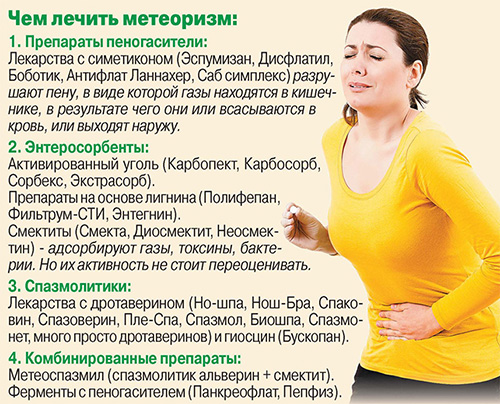
Reduce portions and intervals between meals. Food must be subjected to heat treatment (boiled, stewed, steamed). In the absence of diarrhea, sour-milk drinks (kefir, fermented baked milk, yogurt) are introduced into the diet. This is a good remedy for improving digestion. Dairy products contain a large number of beneficial bacteria that normalize the intestinal microflora.
If the stomach swells, there is a pronounced pain syndrome and no medicines help to alleviate the condition, you should immediately consult a doctor. Such symptoms may indicate intestinal obstruction or other pathologies that require immediate surgical intervention.
- The latest methods of teaching traffic rules
- How to draw pictures by numbers
- Do-it-yourself home digital microscope
- How to choose the right paint for drawing
- When is the best time to sunbathe?
- What kind of bird is better to have in an apartment?
- We put an apostille on the birth certificate on our own
- Is it possible to give flowers in pots - signs
- How to make cat ears
- Gray bag: what to wear and combine?
- How to get started with Faberlic: tips for new consultants
- Bioinsecticide Lepidocid: purpose, properties and application procedure Lepidocide waiting period
- How to change the language to Russian in steam
- Dendrobium noble: room care
- Morphology of plants general concepts - document
- Planting, propagation and care of bamboo at home, photo Growing bamboo from seeds
- How to strengthen the cellular signal for the Internet in the country
- Sanskrit reveals the forgotten meaning of Russian words (2 photos)
- The oldest language Sanskrit programming language of the future Dead language Sanskrit
- Who has dominion over all the earth?



